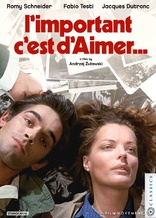L' important c'est d'aimer Blu-ray Movie
HomeL' important c'est d'aimer Blu-ray Movie 
The Most Important Thing: LoveFilm Movement | 1975 | 113 min | Not rated | Jun 16, 2020
Movie rating
6.6 | / 10 |
Blu-ray rating
| Users | 0.0 | |
| Reviewer | 3.5 | |
| Overall | 3.5 |
Overview
L' important c'est d'aimer (1975)
Servais, a reporter and photographer, meets Nadine Chevalier (Romy Schneider), an actress who is forced to earn her living by accepting roles unworthy of her real talent. She is married to Jacques (Jacques Dutronc), a delightful sort of disenchanted clown who runs away from the realities of life. Nadine and Servais soon discover how important their encounter was and neither one of them wants to dismiss it as a mere fling.
Starring: Romy Schneider, Fabio Testi, Jacques Dutronc, Claude Dauphin, Klaus KinskiDirector: Andrzej Zulawski
| Drama | 100% |
| Romance | 13% |
Specifications
Video
Video codec: MPEG-4 AVC
Video resolution: 1080p
Aspect ratio: 1.66:1
Original aspect ratio: 1.85:1
Audio
French: LPCM 2.0 Mono
English: LPCM 2.0 Mono
Subtitles
English
Discs
Blu-ray Disc
Single disc (1 BD)
Playback
Region A (locked)
Review
Rating summary
| Movie | 3.5 | |
| Video | 3.5 | |
| Audio | 4.0 | |
| Extras | 1.0 | |
| Overall | 3.5 |
L' important c'est d'aimer Blu-ray Movie Review
. . .and the César goes to —
Reviewed by Jeffrey Kauffman June 3, 2020The Academy of Motion Picture Arts and Sciences held its first gala where it handed out the statuettes that would famously be nicknamed Oscars on May 16, 1929, when the two previous years of productions were feted. Kind of interestingly, the Brits followed suit, albeit a couple of decades later, when what would ultimately be known as the BAFTAs had its first ceremony on May 29, 1949, when indeed the two previous years of productions were honored. The typically forward thinking French maybe just a bit strangely didn’t get around to honoring their country’s film output until almost three decades after the British started honoring theirs, when the Académie des Arts et Techniques du Cinéma's César Awards debuted on April 3, 1976, in this case defying "tradition" and honoring only the prior year's output. You might think that after waiting that long to honor its "own", Francophile film aficionados might have been prone to handing the first Best Actress award to some notable French icon like, say, Catherine Deneuve, Isabelle Adjani or even Delphine Seyrig (born in Lebanon, but raised in France), all of whom in fact were nominated for the first acting trophy in that particular category. Instead, Romy Schneider scored the statuette for her performance in L'important c'est d'aimer, a win that might be at least a little surprising given France’s somewhat “troubled” relationship with what might be termed Schneider’s native country of Germany (she was actually born in Austria, but her parents moved to Germany just a few weeks after her birth, but of course I'm joking in any case). However, at least a bit like Seyrig, Schneider had long been part of the French film industry, and in fact had been fairly wildly popular there for years, as is discussed in the interesting interview with writer and director Andrzej Żuławski that is included as a supplemental feature on this disc.
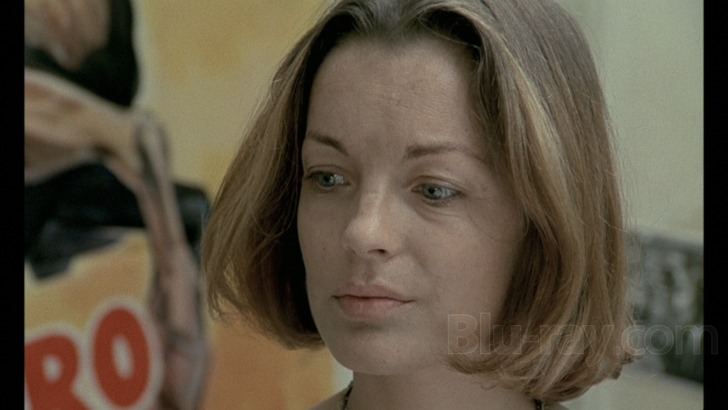
Speaking of the supposedly “forward thinking French”, you might assume that a culture that invented phrases like ménage à trois and laissez faire might be pretty sanguine about their cinematic output, but this is perhaps the only French film I have ever seen that begins with a rather lengthy text warning that not only is the film “X rated” (in that no one under 18 is officially allowed to see it), it’s so provocative that even adults might be disturbed by some of its representations. There are certainly some shocking moments in L'important c'est d'aimer, but they’re often wrapped in what might be termed some Sirkian melodrama, so much so that the underlying emotional issues may brunt the effect of the imagery, at least for some.
There’s a “meta” aspect almost from the get go in L'important c'est d'aimer, with a woman soon identified as actress Nadine Chevalier (Romy Schneider) facing the camera, who it turns out really is facing a camera and who is being downright hounded by a harridan female director who quickly comes into frame with her camera crew in tow. Chevalier is in a bizarre soft core scene where she’s supposed to straddle her badly wounded lover and tell him “I love you,” since (per the director’s tirade) his injuries are supposed to turn her on. It’s patently bizarre, and made even more so by the sudden introduction of what some may assume is the set’s still photographer, Servais Mont (Fabio Testi). However, it turns out Mont is an interloper and Nadine, in an almost pitiful voice, begs him not to take pictures of her, with the implication being perhaps she’s ashamed to have to make her living this way.
In just one of several kind of weird elisions this film makes, after Mont engages in a fist fight with some of the film crew, he still ends up with some photos of Nadine. Is he one of the paparazzi? Not really, since even Nadine admits, when Mont later just strangely shows up at her house unannounced, she’s not exactly “A-list” material. This particular plot point was just one of several that left me wanting a bit more information — how, for example, does Mont know where Nadine lives (especially since she’s evidently not that “famous”), or even more, what her phone number is (he alludes to that later)? Also, in a rather odd moment, Nadine first tells him she doesn’t remember him, and then just lets him in her house, where she allows him to start taking pictures of her, even while her husband Jacques (Jacques Dutronc) is puttering around making some rather odd noises. The husband is another patently bizarre element to this film, a guy who is a cineaste, as evidenced by his poster collection and some of his comments, but who initially comes of as perhaps mentally deficient. It’s all very strange, even dreamlike.
In the meantime, it’s revealed that Mont is in some kind of debt to a gangster named Mazelli (Claude Dauphin), and that Mont has been tasked with various unseemly jobs to pay off that debt. In one of the first scenes that some more straitlaced types might deem objectionable, Mont starts to film what appears to be a gay porn movie with two men. Later there's an even more explicit orgy scene where Mont is hiding behind a two way mirror and snapping pictures which can be used for blackmail purposes. There’s obviously a connection being made between Nadine’s oppression as an actress in soft core films, and now Mont’s oppression as someone forced to film porn, and while that may lurk in the background, Żuławski seems to really be concentrating on a good, old fashioned (and very French) ménage à trois between Nadine, Mont and Jacques. Now, anyone looking at a gorgeous Romy Schneider as Nadine (even if she’s often devoid of any makeup, as Żuławski discusses in the supplemental interview) would probably not wonder very long whom she’ll ultimately choose, when you consider the choices are either the uber-hunky, stalwart Mont or the nerdy, neurotic Jacques. That said, the film goes to rather melodramatic lengths to get to a perhaps foregone conclusion.
That said, some of the melodrama is intentionally hyperbolic (I’m personally not sure any of this film isn’t hyperbolic). That includes a middle section where Mont attempts to get Nadine some “legitimate” work and, in league again with Mazelli’s money, finances a production of Richard III starring a patently gonzo actor named Karl-Heinz Zimmer (a perfectly cast Klaus Kinski). This almost lunatic subplot provides a needed jolt of energy partway through the film, but if there’s some “meta” aspect with regard to Richard III being utilized, it’s evidently above my pay grade. At any rate, this brings to a head what really is a set of dysfunctional relationships, although the way Nadine and Jacques clash is different from the way Nadine and Mont clash.
L'important c'est d'aimer circles back on itself like a cinematic Möbius strip twice, first with regard to Jacques (who foreshadows a bit of plot during the rehearsals for Richard III), and then with a final scene that sees Life imitating Art in terms of Nadine and a wounded lover. But the film’s ultimate emphasis seems to be that love is inextricably linked to almost unbearable pain. That at least gives the usually glamorous Schneider a chance to “de-glam” and show a vulnerable, raw side, not to mention a chance to repeatedly cry crocodile tears and have a really badly running nose due to her traumas.
L' important c'est d'aimer Blu-ray Movie, Video Quality 
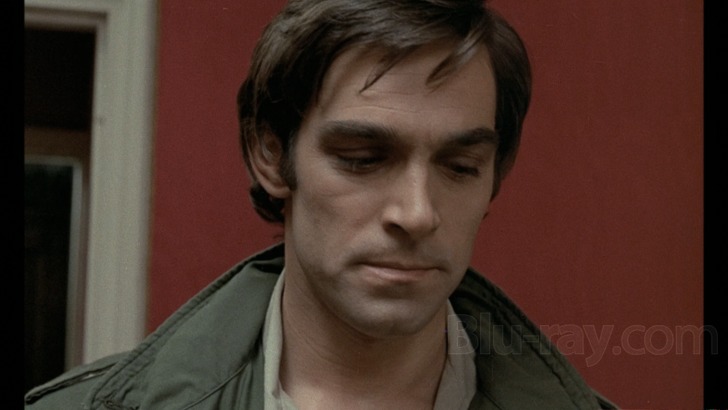
L'important c'est d'aimer is presented on Blu-ray courtesy of Film Movement Classics, an imprint of Film Movement, with an AVC encoded 1800p transfer in 1.66:1. Film Movement's insert booklet only offers a generic "new digital transfer", without providing any further information. I haven't been able to track down anything definitive about any ostensible restoration, but there are some recurrent signs of age related wear and tear here, even if almost all of them are rather small and fleeting. While a couple of more noticeable large scratches show up and disappear quickly, the presentation is littered with all sorts of speckling that comes in a variety of colors. Many of the little flecks are white, but several are either blue or purple, as can be made out in screenshots 18 and 19, especially if you look at them in full resolution. These are very fleeting, I want to make clear, but they're noticeable through the presentation. They were very hard to catch with our screencapture unit because they're so fleeting, and it was just by chance that the ones I caught look a bit more "horizontal", as many of these noticeable blips tend to run more vertically on the image. Aside from that issue, there are some density fluctuations and minor flicker that can be spotted against darker backgrounds in particular. The palette is a bit anemic looking, though fine detail levels can be rather good, as in the fluff on the bathrobe seen in screenshot 10.
L' important c'est d'aimer Blu-ray Movie, Audio Quality 
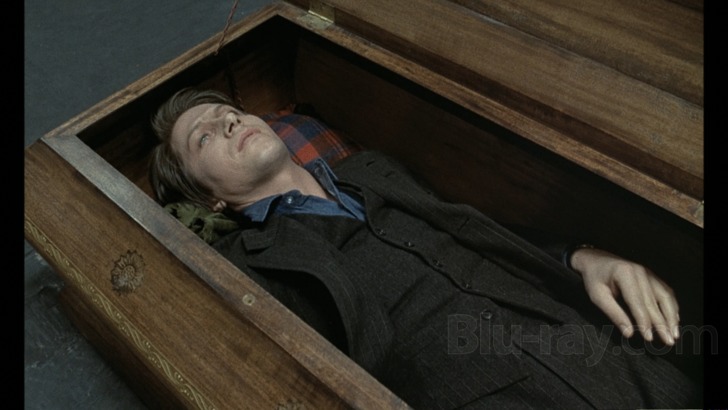
L'important c'est d'aimer features LPCM 2.0 mono tracks in the original French, as well as an English dub. While it looks like not everyone was speaking French on set, and the entire film may have been post-looped, leading to the frequent issue of "loose sync", the French track is clearly superior here. It offers better clarity and depth, with Georges Delerue's kind of overpowering score sounding warmer as well. The English track actually sounds a bit muffled, especially in the midranges, something that can tend to make some of Delerue's string drenched cues sound a bit dark. The English track also sounds like it's getting close to breaking up at a couple of its loudest spikes.
L' important c'est d'aimer Blu-ray Movie, Special Features and Extras 
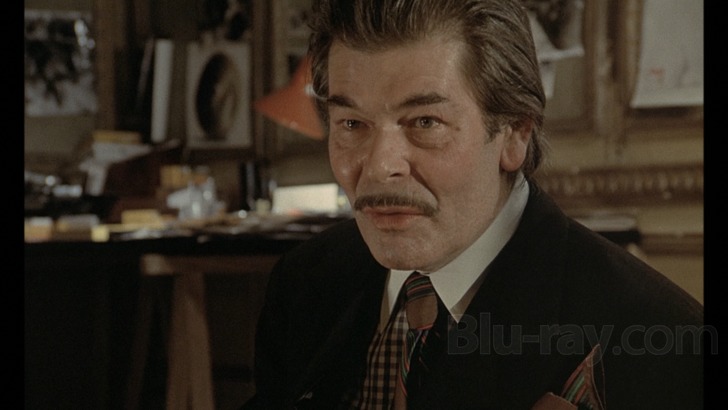
- Interview with Andrzej Żuławski (480i; 16:22) features the late director in an archival interview where he discusses the project. He does kind of humorously state that he hates the title of the film, which was evidently forced on him. In French with English subtitles.
- Original Trailer (480i; 3:41)
L' important c'est d'aimer Blu-ray Movie, Overall Score and Recommendation 
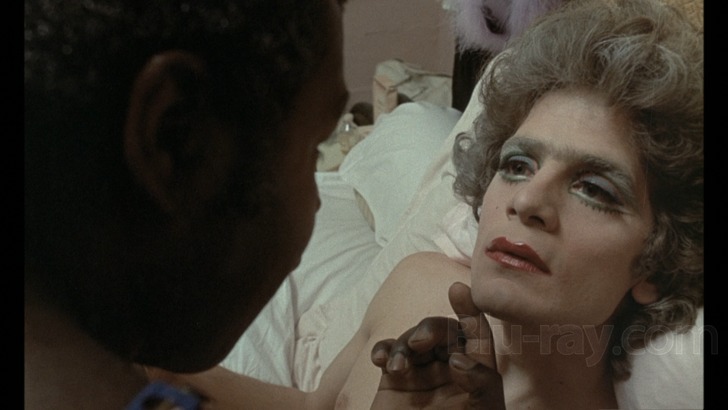
L'important c'est d'aimer is held in rather high esteem by a number of Francophile film experts who have crossed paths with me through the years, but this is one film that sometimes struck me personally as being a bit too self conscious for its own good, with some underlying smarm and silliness in about equal measure that may rob the story of some of its aimed for impact. Żuławski is obviously making a statement here about "big ticket" items like, you know, Life and Art, but some of the overheated aspects may chafe at times. That said, the film is almost trance inducing after a while, and it offers several memorable performances. Technical merits are okay if improvable (video) to fine (original French audio), and the supplementary interview with Żuławski is quite interesting. Recommended.
Other editions
That Most Important Thing: Love: Other Editions
Similar titles
Similar titles you might also like

The French Lieutenant's Woman
1981

Indiscretion of an American Wife
Terminal Station / Stazione Termini
1953

Summertime
1955

Quartet
1981

The Europeans
1979

Blood and Sand
1922

I Know Where I'm Going!
1945

Room at the Top
1959

Walk on the Wild Side
1962

The Wild Heart
Gone to Earth
1950

History Is Made at Night
1937

Heavenly Bodies
1984

Hester Street
4K Restoration
1975

Bullfighter and the Lady
1951

My Brother's Wife
1966

The Raging Moon
Long Ago, Tomorrow
1971

Gas, Food, Lodging
Arrow Academy
1992

The Pillow Book
1996

In the French Style
Limited Edition to 3000
1963

Accident
1967
